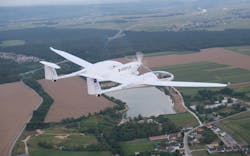Joby subsidiary H2FLY completes first piloted flight of liquid hydrogen aircraft
MARIBOR, Slovenia - H2FLY in Stuttgart, Germany, which is a wholly-owned subsidiary of Joby Aviation in Santa Cruz, California, announced the successful completion of the first piloted flight of a liquid hydrogen-powered electric aircraft. The flight took place over Maribor, Slovenia.
The flights, Joby says, demonstrate the viability of using cryogenically-stored liquid hydrogen instead of gaseous hydrogen, which enables significantly lower tank weights and volume, leading to longer range. The successful installation and demonstration of flight with liquid hydrogen is believed to increase the range of H2FLY’s HY4 demonstrator aircraft from 466 miles to 932 miles , marking a critical step towards the long-term decarbonization of mid- to long-range aviation.
The successful flights are the culmination of Project HEAVEN, a European-government-supported consortium assembled to demonstrate the feasibility of using liquid hydrogen in aircraft. The consortium is led by H2FLY and includes the partners Air Liquide, Pipistrel Vertical Solutions, the German Aerospace Center (DLR), EKPO Fuel Cell Technologies, and Fundación Ayesa.
H2FLY, acquired by Joby in 2021, continues to lead the industry on the development and testing of hydrogen aviation propulsion systems. The company completed a series of piloted flights with its HY4 demonstrator aircraft, including one that lasted more than three hours, fitted with a hydrogen-electric fuel cell propulsion system and liquid hydrogen that powered it for the entire flight.
“H2FLY are pioneers in their field, and we’re proud of them achieving this watershed moment in the use of liquid hydrogen to power aircraft,” said JoeBen Bevirt, Founder and CEO of Joby Aviation. “In the years to come, battery-electric and hydrogen-electric propulsion systems will enable us to build aircraft that are quieter and make mid- to long-range air travel possible with zero emissions. It’s critical we take action now and invest aggressively in these technologies for the health of our planet and future generations to come.”
